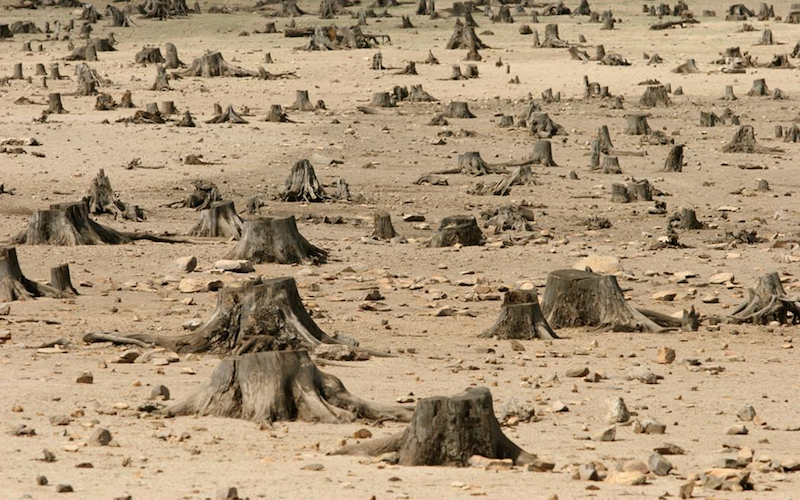
The Environmental Impact of China’s Investment in Africa
Protection of the environment has never been a particularly high priority for African governments. A recent study by the Pew Research Center of 44 countries, including nine from Africa, looked at five of the greatest dangers facing the world. Pollution and the environment was one of the five dangers and it ranked as least important by all but one of the nine African countries. By contrast, persons in China ranked pollution and the environment as the most important threat.
Until about five years ago, however, China had a disengaged approach to the environmental practices of Chinese companies operating overseas. There is growing evidence that China is now encouraging its companies as they invest in Africa and elsewhere to follow better environmental practices. In 2013, China’s Ministry of Commerce and the Ministry of Environmental Protection issued voluntary guidelines for the first time that encourage companies investing overseas to follow local environmental laws, assess the environmental risks of their projects, minimize the impact on local heritage, manage waste, comply with international standards, and draft plans for handling emergencies. But if companies choose to ignore the guidelines, there is no penalty.
Chinese companies are also showing a greater interest in signing on to the UN Global Compact, which contains provisions aimed at protecting the environment. More than 200 Chinese private and state-owned businesses have signed the Compact. But again the Compact is voluntary and a relatively small percentage of Chinese companies operating in Africa have signed it so far. Chinese companies most reluctant to improve their environmental practices are small private ones and medium-sized ones affiliated with Chinese provincial and municipal administrations.
It is useful to look briefly at Chinese environmental law and practice because that is what China is most likely to pursue overseas. In 2012, the 18th National Congress of the Communist Party adopted “ecological civilization” as one of the five pillars driving policy. By the end of 2012, the National People’s Congress approved 10 environmental laws and 30 resource protection laws.
As China’s environmental challenges have become more serious, there has been growing interest in the use of the court system to deal with polluters. There has been a rapid growth of environmental courts in China following a pollution crisis in parts of the country. It is too early to judge if the pollution courts will result in significant improvement of the environment.
China’s environmental legislation is now strong on paper, but its implementation tends to be weak. Much depends on the efforts of local governments, which have considerable autonomy, and other state agencies. One of the most important Chinese environmental organizations concluded that Chinese enterprises appear to be 15 to 20 years behind their Western counterparts when it comes to the adoption of modern social and environmental approaches to their outward FDI.
There is a new concern that China will address its domestic industrial pollution by relocating some of its highest polluting facilities such as steel, cement, and tanneries to places like Africa. In 2014, Hebei Iron and Steel announced that it is building a plant in South Africa capable of making five million tons annually. This is good for South African jobs, but potentially bad for the environment. China has become a major investor in the leather industry in Ethiopia and owns numerous tanneries, which are well known for their pollution potential. Some of their practices have been criticized. Of course, Western companies also increasingly export high pollution manufacturing activities.
African environmental law and practice, to the extent you can generalize about 54 different countries, leave much to be desired. Africa-wide and sub-regional environmental initiatives have suffered as a result of slow policy implementation, inadequate environmental legislation and institutions at the national and sub-national levels, poor legal enforcement, and insufficient financial and human capacity to implement the agreements.
The approach of individual African countries towards protection of the environment varies enormously. Some countries have impressive legislation in place while others are lagging behind. In all countries, however there are serious shortfalls in funding and human capacity to implement programs to protect the environment. In most African countries, the environmental laws and standards are much lower than accepted international norms.
When evaluating the impact of Chinese FDI on the environment in Africa, it is important to put it in the context of global FDI entering Africa. China provides a relatively modest amount of the global FDI that has gone to Africa so far. According to Chinese official figures, the cumulative FDI figure at the end of 2012 was just over $21 billion. The actual amount may be twice that figure. By comparison, however, at the end of 2012, American companies had cumulative FDI in Africa of more than $61 billion.
Like most global FDI in Africa, Chinese FDI is concentrated in sectors of the economy that are especially vulnerable to environmental concerns such as energy, mining, fishing, and forestry. Chinese companies have invested in mines that are sometimes located in ecologically fragile areas where there is a higher risk of environmental degradation. They also often generate greenhouse gases, solid and liquid waste, including hazardous products such as cyanide and mercury.
Chinese fishing vessels have been criticized for worsening food insecurity among Africans because they catch small species that are the main source of food and income for small-scale African fishermen.
China is the largest importer of Africa’s tropical wood. While much of this activity constitutes only trade, some of it involves FDI by Chinese logging and timber trading companies. Chinese companies have a tendency to violate local forestry laws together with African counterparts. The illegal practices include abuse of permits and concession licenses, bribery, operating without management plans, under-reporting export volume, smuggling raw logs, and harvesting and transporting undesignated species.
The government of China is sensitive to criticism of its companies in the forestry sector. In 2009, the State Forestry Administration and Ministry of Commerce issued voluntary guidelines which encourage Chinese companies to manage, utilize, and protect overseas forests in order to play a positive role in sustainable development of global forest resources.
The environmental issue for which China has attracted the most criticism is the importation of products taken from African endangered species, especially elephant ivory and rhino horn. Most of this activity falls, however, in the category of illegal trade and not FDI.
Another controversial activity from the standpoint of environmental implications is the construction of dams in Africa, but these are done as commercial contracts and not as FDI. While they may have negative environmental implications, they provide clean power. China has also become a leader in wind and solar power that have minimal environmental downsides. Africa is a small but growing market for these Chinese exports.
There is widespread agreement that Chinese companies, more than Western companies, need to improve their environmental practices as they invest in Africa. Several case studies illustrate the point.
The China National Petroleum Corporation has a 40 percent stake in the umbrella organization that developed the oil fields in Sudan and South Sudan. Seismic surveying created hundreds of kilometers of bulldozed tracks, destroying farmland and increasing deforestation. Road construction disrupted water flows, which damaged irrigation systems and forced the evacuation of several communities. The most damaging impact has been the discharge of contaminated “produced water” from oil reservoirs and the improper disposal of drilling mud and other waste. Sudanese government officials were more interested in advancing the oil industry than enforcing environmental laws.
In Chad, the China National Petroleum Corporation purchased the shares related to a permit held by a Canadian oil company. Known as the Rônier project, the Chinese company solicited $1 billion in Chinese financing to build a 311-kilometer pipeline connecting the oil fields to a refinery. Construction began in the oil fields and along the pipeline route before approval of the environmental assessment. Once construction was underway, residents complained about traffic noise and air pollution caused by the company’s trucks.
In 2012, the Chadian oil minister suspended all operations of the Chinese company for flagrant violations of environmental regulations while exploring for crude. The minister alleged the company did not have the equipment for cleaning up oil spills and intentionally allowed it to spill. in 2014, Chad withdrew five exploration permits after the company refused to pay a fine of $1.2 billion for “unacceptable practices” that led to oil spills around drilling sites.
In 2002, Gabon designated a quarter of its territory as nature reserve in an effort to protect mainly pristine rainforest that hosts a variety of flora and fauna. Environmental concerns over Chinese practices first arose when SINOPEC began prospecting for oil in the Loango National Park. In 2006, the government of Gabon ordered SINOPEC to halt its exploration activities.
The problems with SINOPEC occurred as the China National Machinery and Equipment Import and Export Corporation and Sinosteel Corporation were at an early stage of developing a multi-billion dollar iron ore concession in the Belinga Mountains. The project included construction of a major dam to provide power. The infrastructure work in connection with the dam threatened a national park and caused massive deforestation. The Chinese company had to abandon the project.
China is the largest importer of Mozambique’s hardwood timber; an estimated 80 percent of all logging in Mozambique is illegal. A huge percent of the timber exported to China, therefore, has been harvested illegally. Chinese companies in Mozambique traditionally emphasized quick returns by purchasing indigenous timber rather than investing in processing facilities and sustainable forest management. Increasingly, however, Chinese entrepreneurs began to acquire their own concessions in order to ensure access to timber supply. The most common illegal activity in the timber trade involved harvesting in excess of licensed amounts, harvesting without a license, and harvesting in an area other than the licensed one. At the end of the day, Mozambicans were primarily responsible for this environmental tragedy. They allowed the abuses by corrupt companies.
While the perception of China’s environmental performance in Africa is more negative than the reality of the situation, there is plenty of room for legitimate criticism. Part of the problem stems from the fact that critical accounts get more attention than positive ones and negative stories tend to be replayed year after year. There have been improvements in the operations of Chinese companies that are slow to be acknowledged by environmental groups or fail to be covered in the press.
The government of China has become more sensitive to criticism of overseas investment by Chinese companies and has made a concerted effort to improve environmental guidelines and encourage their implementation. It also encourages Chinese companies to apply Chinese laws and standards in their overseas operations. But all of the guidelines that apply to Chinese companies operating overseas are voluntary. Chinese environmental policy, lending institutions, and companies investing in Africa are playing catchup.
Many African countries attach a low priority to environmental protection, have understaffed environmental bureaucracies, and have even worse records for countering corruption than does China. Numerous African officials are also reluctant to call out Chinese companies that engage in unacceptable environmental practices because they do not want to jeopardize Chinese investment or good relations with the government of China. Consequently, it will often be up to the Chinese company to take the initiative in ensuring better environmental practices.
In the final analysis, it is in the interest of both China and the African countries to pursue sound environmental practices and sustainable development.
This article is adapted from a lecture originally delivered at Yale University.
